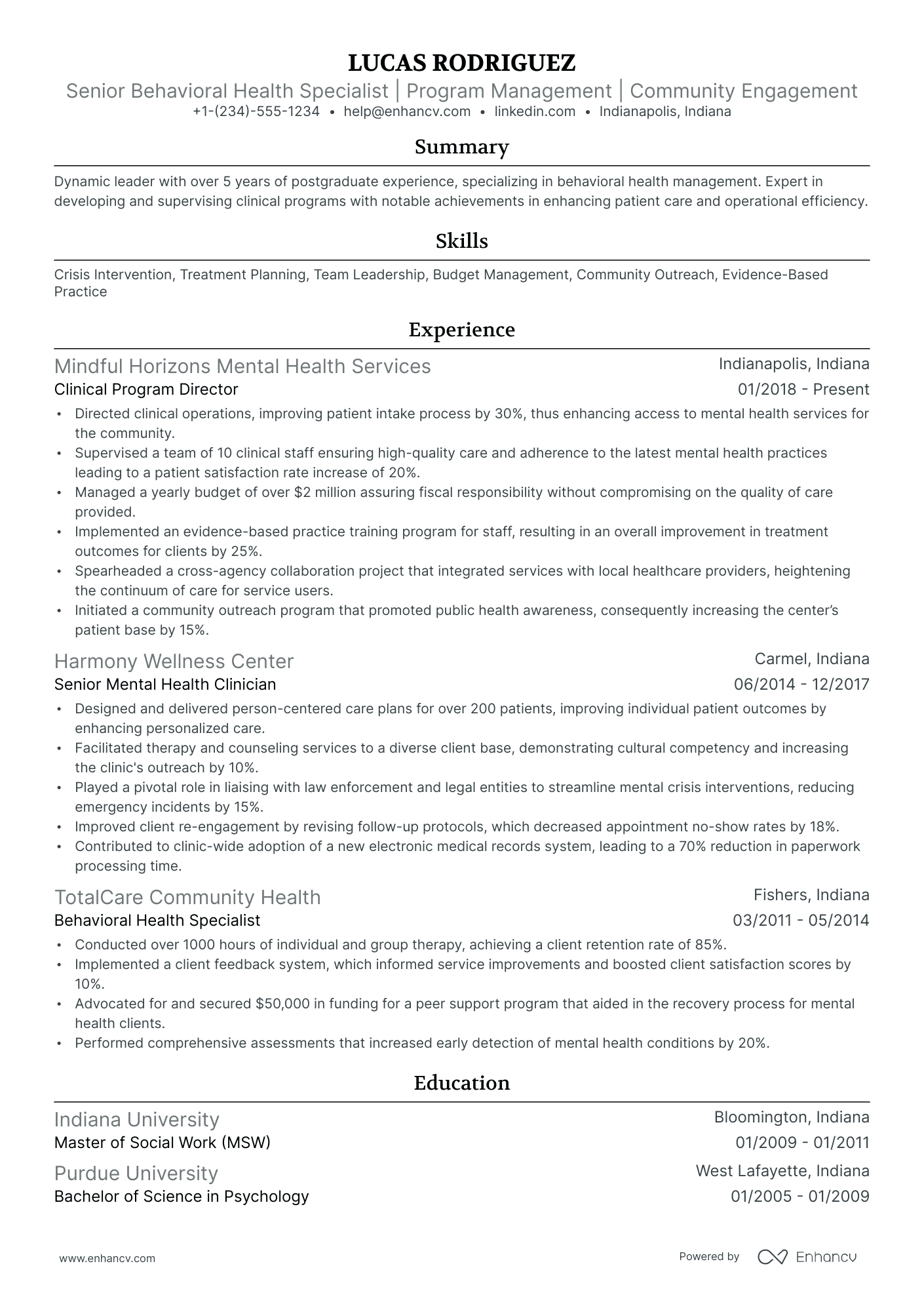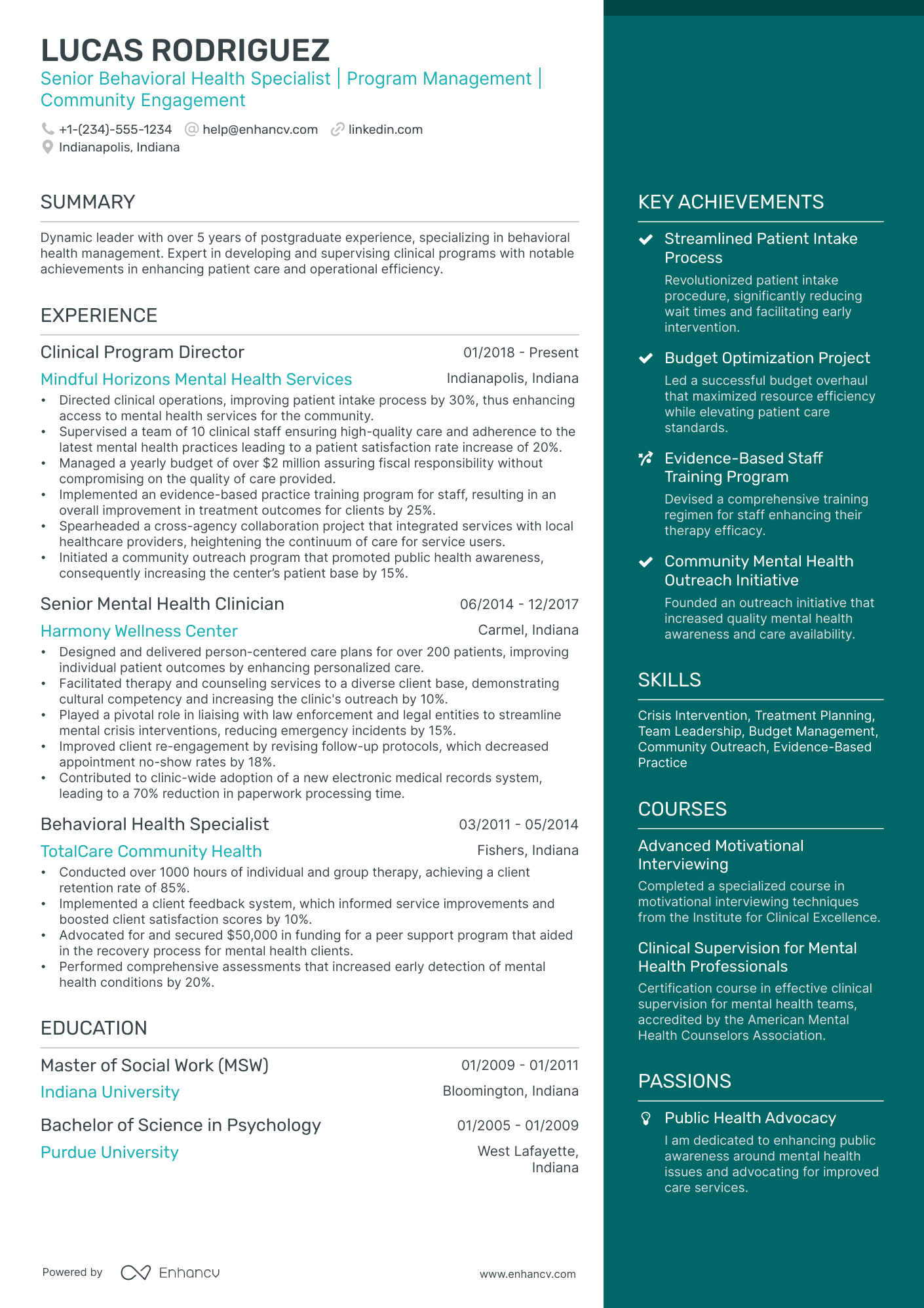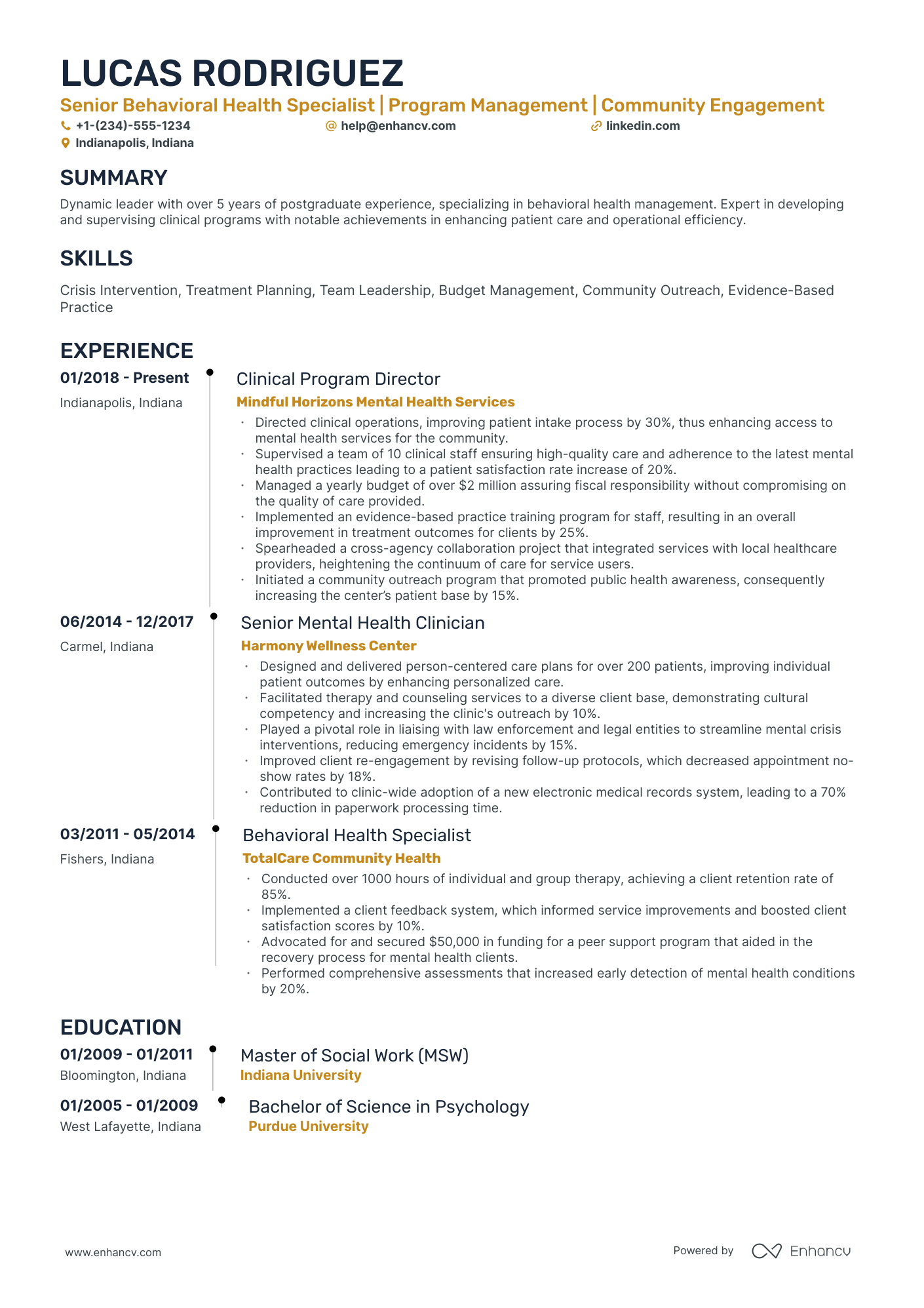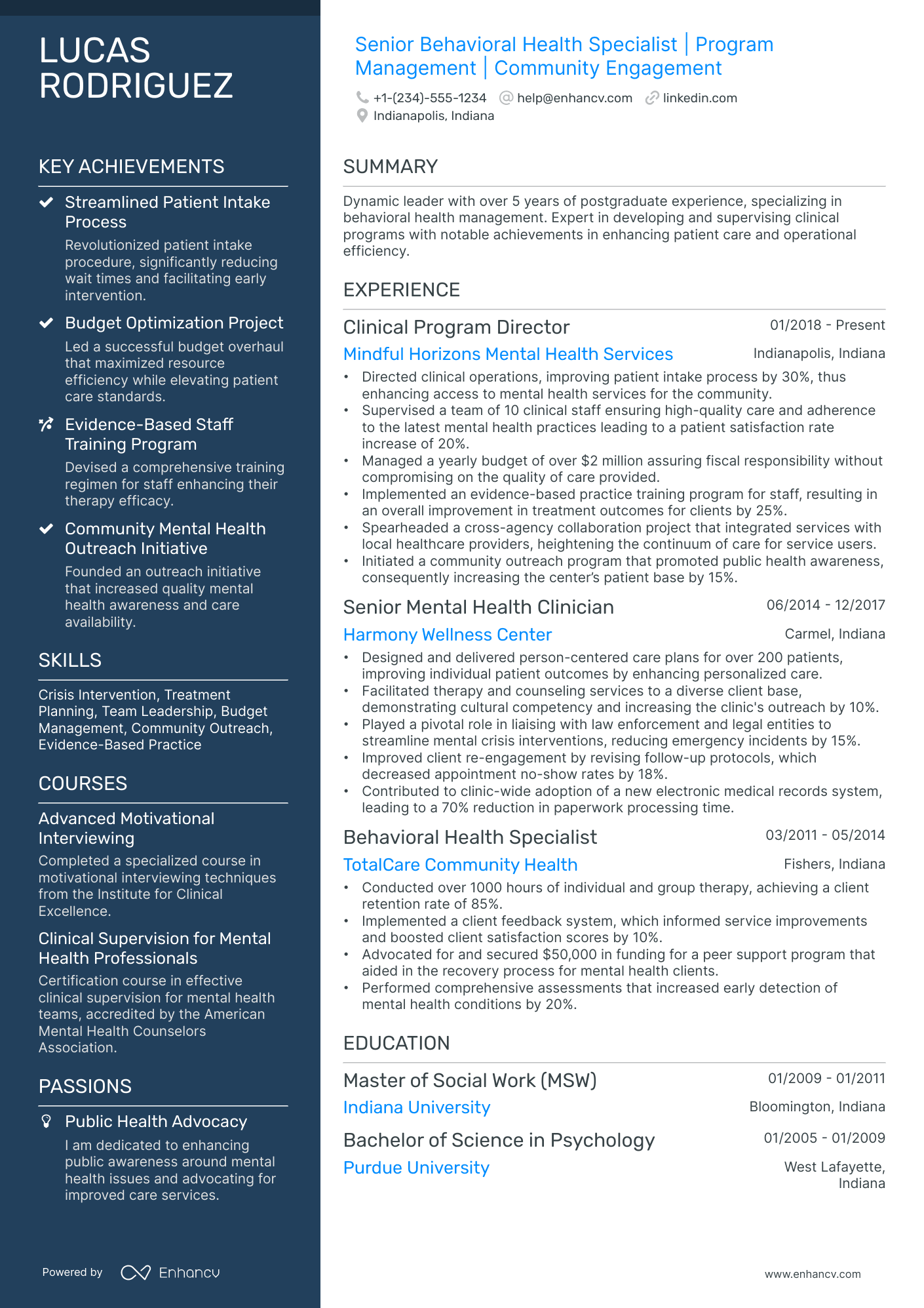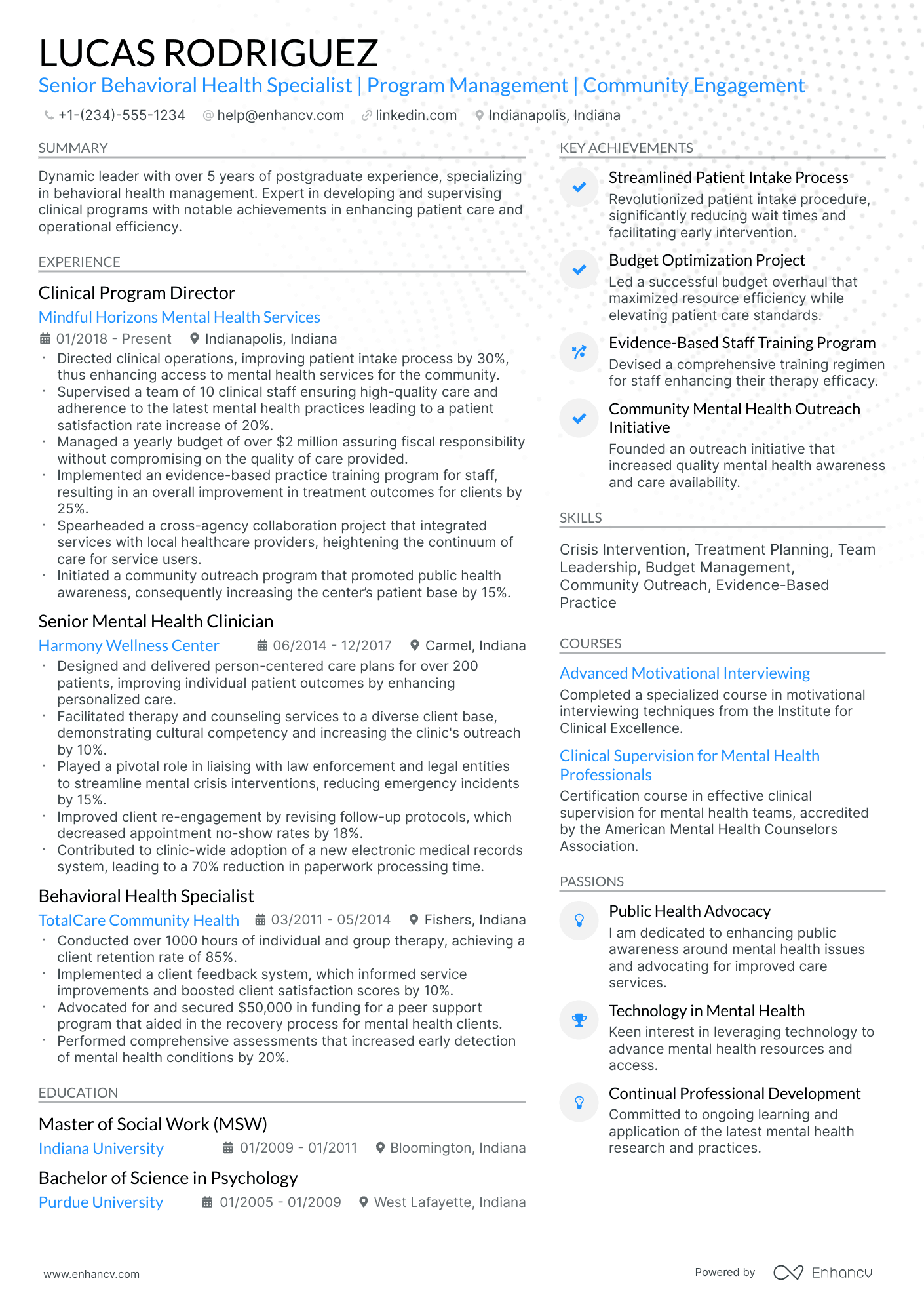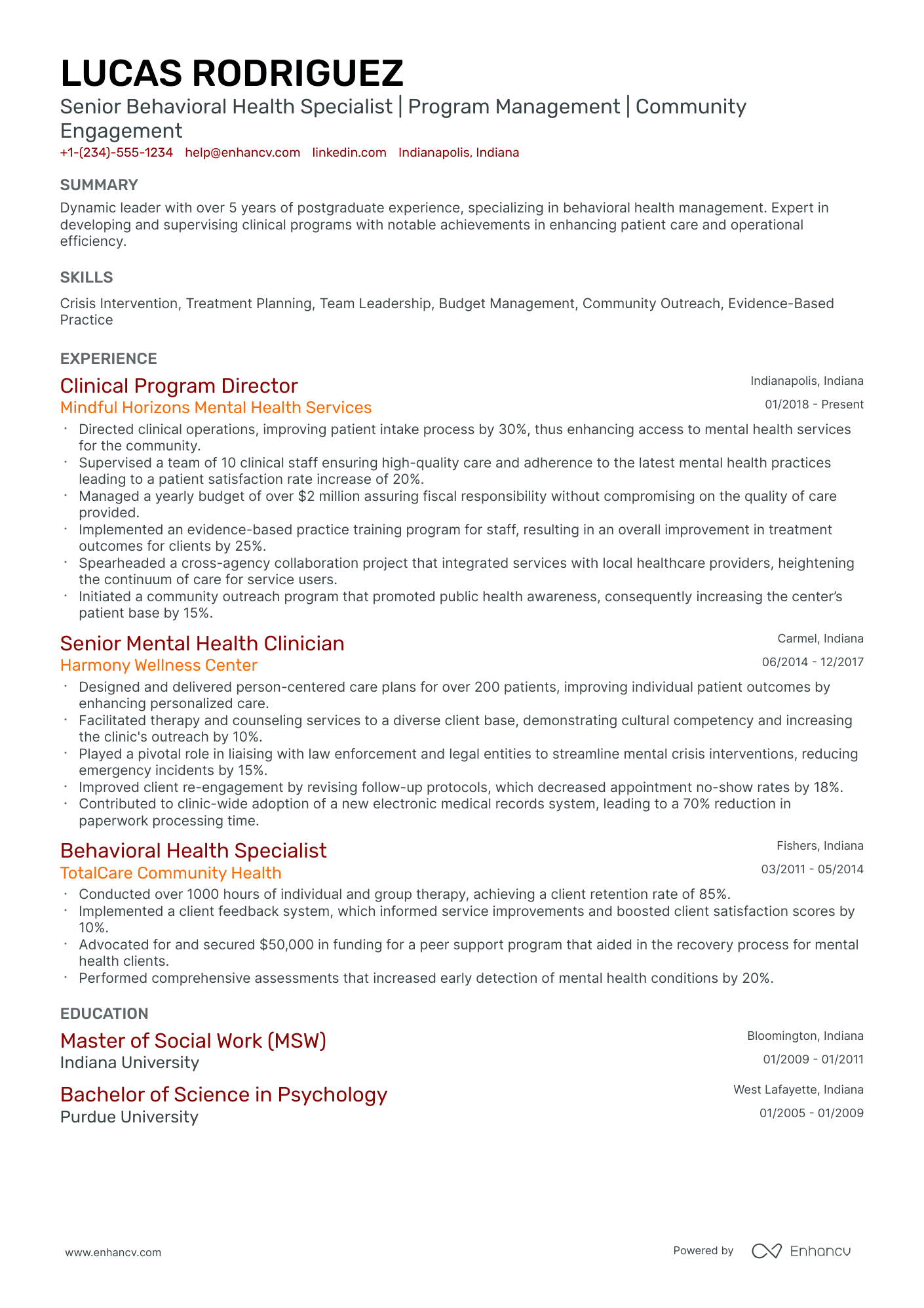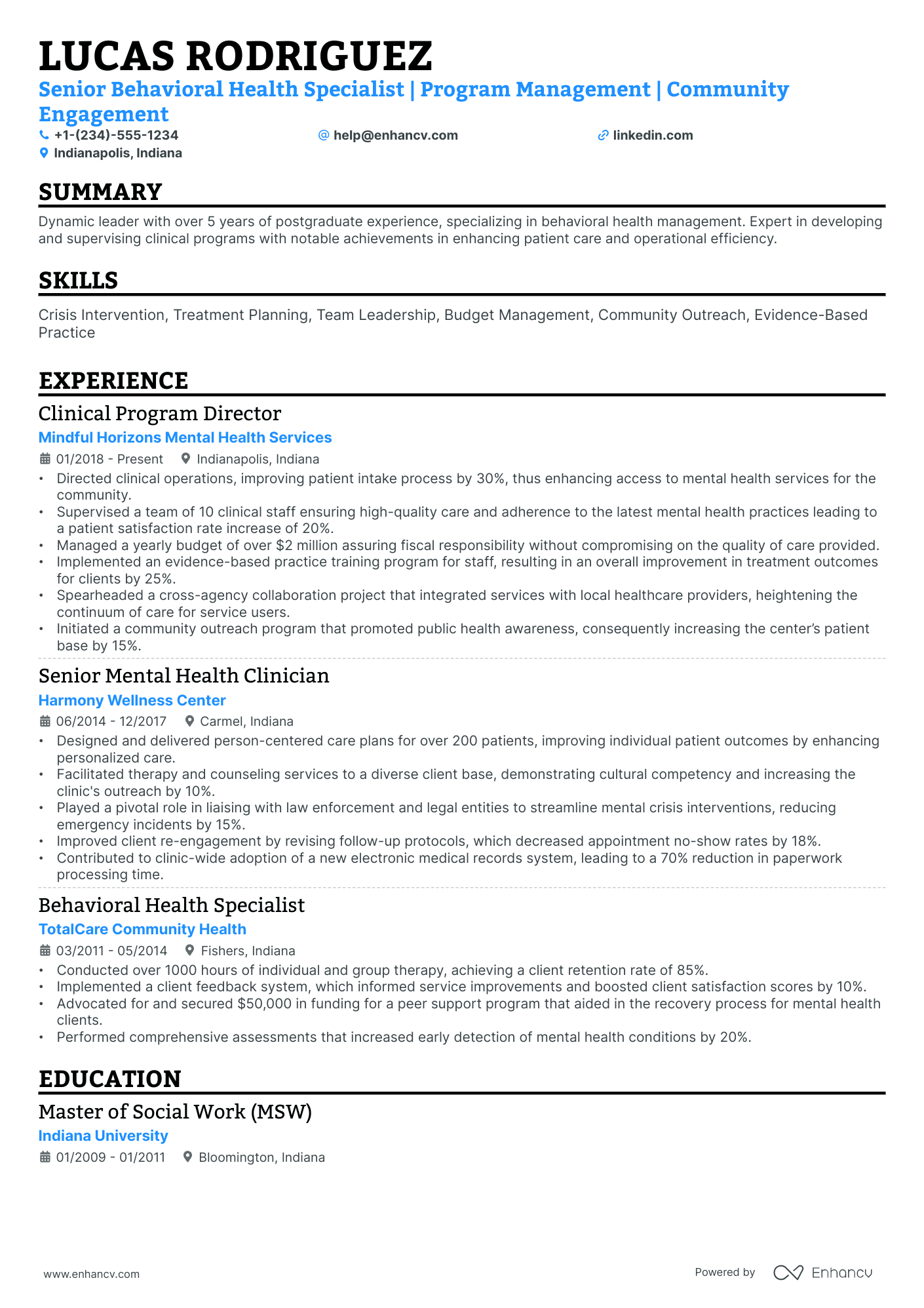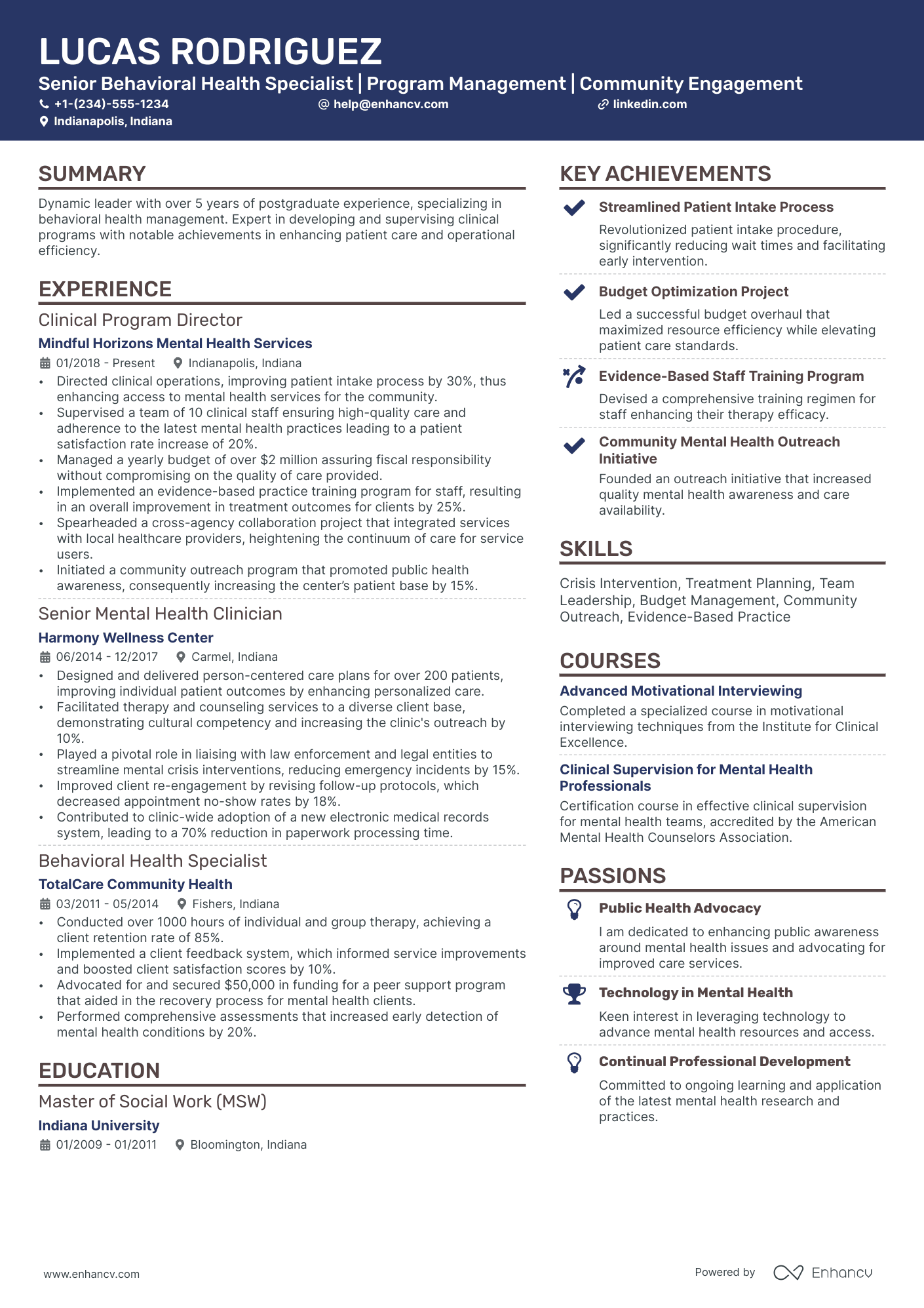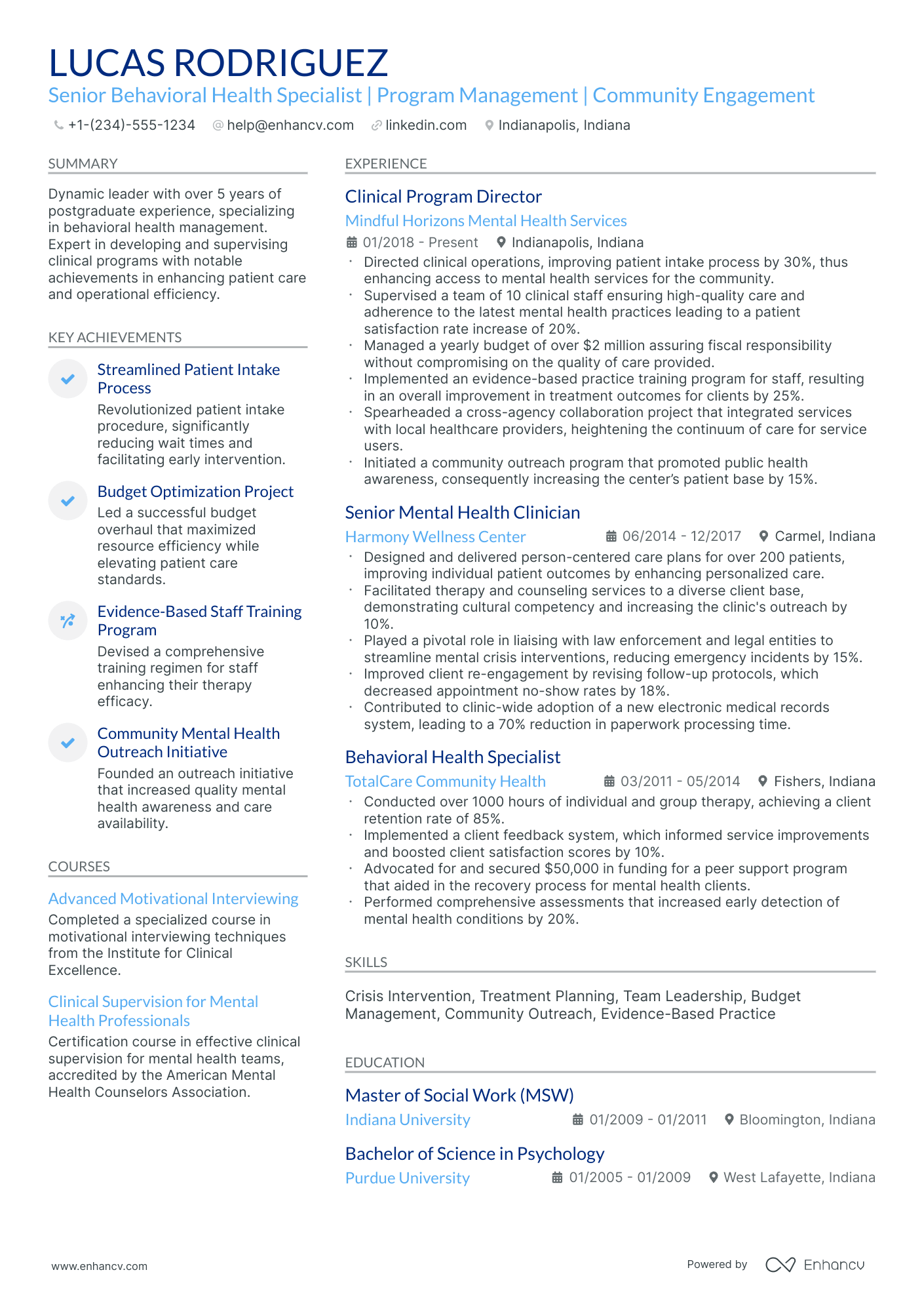As a mental health program manager, articulating the breadth of your diverse experience without overwhelming potential employers can be a significant resume challenge. By utilizing our guide, you'll learn how to succinctly showcase your expertise and capture the essential aspects of your professional journey, ensuring your resume stands out for the right reasons.
- Sample industry-leading professional resumes for inspiration and mental health program manager resume-writing know-how.
- Focus recruiters' attention on what matters most - your unique experience, achievements, and skills.
- Write various resume sections to ensure you meet at least 95% of all job requirements.
- Balance your mental health program manager technical expertise with personality to stand out amongst candidates.
If the mental health program manager resume isn't the right one for you, take a look at other related guides we have:
Don't stress out over your mental health program manager resume format
Remember, the elaborate design of your mental health program manager resume isn't what impresses recruiters most. They are primarily searching for candidates who meet the job requirements. The main aim of your resume should be to clearly and concisely explain why employers should hire you.
Here are four straightforward steps to consider in your mental health program manager resume design:
- Organize your resume based on experience: Start with your most recent roles. Besides using reverse chronological order, choose jobs relevant to the position you're applying for.
- Include your contact details (and portfolio or LinkedIn link) in your resume's header to ensure recruiters can easily reach you. If considering adding a professional photo, check acceptable practices in different countries first.
- Don't omit essential mental health program manager resume sections such as the summary or objective, experience, and education. These sections should reflect your career progression and align with job requirements.
- Maintain conciseness in your resume. For those with less than ten years of experience, a one-page format is advisable.
Regarding the format to submit your mental health program manager resume, PDF is preferable. PDFs are more likely to maintain their formatting when processed through recruitment software or ATS, saving you time in the application process.
When selecting a font for your mental health program manager resume, consider the following:
- Choose ATS-friendly fonts such as Exo 2, Volkhov, Lato, etc., to keep your resume's content legible;
- All serif and sans-serif fonts are easily readable by ATS;
- While Arial and Times New Roman are common choices, opting for unique typography can help your resume stand out.
Concerned about ATS compatibility with charts and infographics? Our recent study has debunked this and other myths.
Different markets have specific resume formats – a Canadian resume could vary in layout.
Upload & Check Your Resume
Drop your resume here or choose a file. PDF & DOCX only. Max 2MB file size.
PRO TIP
If you happen to have plenty of certificates, select the ones that are most applicable and sought-after across the industry. Organize them by relevance to the role you're applying for.
Don't forget to include these six sections on your mental health program manager resume:
- Header and summary for your contact details and to highlight your alignment with the mental health program manager job you're applying for
- Experience section to get into specific technologies you're apt at using and personal skills to deliver successful results
- Skills section to further highlight how your profile matches the job requirements
- Education section to provide your academic background
- Achievements to mention any career highlights that may be impressive, or that you might have missed so far in other resume sections
What recruiters want to see on your resume:
- Demonstrated experience in designing and implementing mental health programs.
- Knowledge of evidence-based practices in mental health care and program evaluation.
- Experience with grant writing and managing budgets for mental health initiatives.
- Strong leadership and team management skills to oversee diverse professional teams.
- Ability to develop and maintain community partnerships and liaise with stakeholders.
Quick formula for writing your mental health program manager resume experience section
Have you ever wondered why recruiters care about your mental health program manager expertise?
For starters, your past roles show that you've obtained the relevant on-the job training and expertise that'd be useful for the role.
What is more, the resume work experience section isn't just your work history , but:
- shows what you're capable of achieving based on your past success;
- proves your skills with (oftentimes, tangible) achievements;
- highlights the unique value of what it's like to work with you.
To ensure your resume work experience section is as effective as possible, follow this formula:
- start each bullet with a powerful, action verb , followed up by your responsibilities, and your workplace success.
The more details you can include - that are relevant to the job and linked with your skill set - the more likely you are to catch recruiters' attention.
Additionally, you can also scan the job advert for key requirements or buzzwords , which you can quantify across your experience section.
Not sure what we mean by this? Take inspiration from the mental health program manager resume experience sections below:
- Spearheaded the development and implementation of a new digital therapy platform, increasing patient engagement by 40% within the first year.
- Oversaw a team of 25 mental health professionals, ensuring a 95% client satisfaction rating through effective program management and staff training.
- Secured a $2 million grant for the expansion of mental health services to underserved communities, boosting program reach by 30%.
- Coordinated a successful pilot program for integrating behavioral health with primary care, leading to a permanent service addition in 3 health centers.
- Managed a cross-functional team to deliver training sessions on mental health first aid, training over 200 employees across the organization.
- Implemented evidence-based therapies into daily practice, which decreased average treatment duration by 15% without sacrificing care quality.
- Designed a comprehensive staff well-being program that resulted in a 20% decrease in staff turnover within the first two years.
- Facilitated the adoption of a patient-centric care model, improving patient adherence to treatment plans by 30%.
- Collaborated with stakeholders to evaluate program effectiveness, leading to a 25% increase in funding for the following fiscal year.
- Managed a portfolio of community mental health programs, increasing participant numbers by over 500 individuals within a three-year period.
- Conducted comprehensive program audits that identified key areas for improvement, subsequently increasing operational efficiency by 20%.
- Led a successful campaign to raise awareness about mental health issues, resulting in the establishment of 5 new community support groups.
- Drove the integration of a telemental health service that expanded access to care for over 2,000 patients in rural areas.
- Managed clinical staff across multiple facilities, ensuring compliance with state regulations and maintaining a 98% accreditation score.
- Optimized budget allocation for clinical services, reducing unnecessary expenditures by 15%, while maintaining high standards of patient care.
- Led a strategic initiative to transition to a patient-centered care model, resulting in a 35% improvement in patient-reported outcomes.
- Directed the launch of a mobile crisis response unit, which decreased emergency room visits due to psychiatric crises by 50%.
- Fostered partnerships with local organizations to support mental health initiatives, securing an extra $1.5 million in funding for community programs.
- Initiated and led a multi-year mental health awareness campaign that reached over 10,000 individuals and enhanced community engagement.
- Developed a volunteer program that trained 150 individuals in peer support roles, expanding service capabilities without adding to payroll expenses.
- Cultivated a collaborative research program with universities to study the effectiveness of outreach interventions on long-term mental health outcomes.
- Streamlined program operations for a network of mental health clinics, improving service delivery times by 25%.
- Implemented a data-driven approach to monitor program outputs and outcomes, leading to an evidence-based refinement of service offerings.
- Collaborated with finance and human resources departments to manage a $4 million budget, achieving a 5% cost reduction while expanding program offerings.
- Established a new crisis intervention program that served over 1,500 high-risk clients in its first year with a 90% success rate in averting hospitalization.
- Partnered with local law enforcement to provide training on mental health crisis management, improving community safety and support.
- Conducted program evaluations using metrics and feedback to refine services, enhancing overall program efficacy by 18%.
- Supervised the roll-out of an innovative therapy program that reduced average patient hospital stay by 10 days, significantly lowering care costs.
- Led a team that provided round-the-clock mental health support, delivering high-quality care to over 3,000 patients annually.
- Coordinated with local agencies to secure ongoing funding for a transitional housing program for mental health patients post-treatment.
The following content includes information from "O*NET OnLine" by the U.S. Department of Labor, Employment and Training Administration (USDOL/ETA). Used under the CC BY 4.0 license. The data represents the top responsibilities present on the task lists for mental health program manager professionals.
Top Responsibilities for Mental Health Program Manager:
- Direct, supervise and evaluate work activities of medical, nursing, technical, clerical, service, maintenance, and other personnel.
- Develop and maintain computerized record management systems to store and process data, such as personnel activities and information, and to produce reports.
- Plan, implement, and administer programs and services in a health care or medical facility, including personnel administration, training, and coordination of medical, nursing and physical plant staff.
- Conduct and administer fiscal operations, including accounting, planning budgets, authorizing expenditures, establishing rates for services, and coordinating financial reporting.
- Maintain awareness of advances in medicine, computerized diagnostic and treatment equipment, data processing technology, government regulations, health insurance changes, and financing options.
- Establish work schedules and assignments for staff, according to workload, space, and equipment availability.
- Monitor the use of diagnostic services, inpatient beds, facilities, and staff to ensure effective use of resources and assess the need for additional staff, equipment, and services.
- Direct or conduct recruitment, hiring, and training of personnel.
- Manage change in integrated health care delivery systems, such as work restructuring, technological innovations, and shifts in the focus of care.
- Maintain communication between governing boards, medical staff, and department heads by attending board meetings and coordinating interdepartmental functioning.
Quantifying impact on your resume
- Mention the number of programs you have successfully designed and implemented to promote mental health awareness and intervention.
- Highlight the percentage decrease in absenteeism or turnover as a result of your mental health initiatives in the workplace.
- Specify the amount of funding you have secured for mental health programs through grants, sponsorships, or partnerships.
- Quantify the number of individuals or groups who have benefited from the programs under your management.
- Include the number of cross-functional teams you have led or collaborated with to address mental health challenges.
- Provide the percentage improvement in client or patient outcomes as a result of your mental health intervention programs.
- Detail the number of training sessions or workshops you have developed and facilitated for mental health professionals.
- Report on the scale of community outreach programs you have organized, including the number of events and participants engaged.
Action verbs for your mental health program manager resume
Lacking relevant mental health program manager resume experience?
Learn how to write your mental health program manager resume experience in spite of having no real-world (or applicable) experience for the job.
You should:
- Feature relevant projects or publications that could impress recruiters or showcase that you have the basic skill set for the job
- Shift the focus towards your people (communication, organization, etc.) skills to demonstrate that you're a quick learner and can easily adapt to a new environment
- Use the resume objective to not only highlight your accomplishments but also map out how your career plans are perfectly aligned with the company's vision
- Select either the functional-skill-based resume format (that puts the focus on your skills) or the hybrid one (balancing expertise with skills).
Recommended reads:
PRO TIP
If the certificate you've obtained is especially vital for the industry or company, include it as part of your name within the resume headline.
Mental health program manager resume skills: the essential hard skills and soft skills checklist
Ultimately, your mental health program manager resume should hint to recruiters that you possess an array of talents that are indispensable to the role.
For example, listing the technologies and software you're apt at using (or your hard skills) and how you apply them in your day-to-day responsibilities would ensure you meet the technical requirements of the role.
But is this enough to ensure that you make a good impression on recruiters?
Go a step further by detailing the soft skills or personality traits you've attained thanks to your work and life experience.
The best way to balance hard skills and soft skills on your mental health program manager resume is by:
- Highlighting up to three of your most noteworthy career accomplishments in a separate section.
- Listing at least one hard skill and one soft skill you've used to solve a particular challenge or problem.
- Feature niche skills and technologies that would help you stand out amongst candidates.
- Think back on the social impact your efforts have had towards improving the work environment - were you able to always maintain a professional ethic, while enhancing the team culture? Write about your contribution to the role, department, or organization itself as a metric of success.
The skills section of your resume provides you with plenty of opportunities to detail your technical and personal traits.
All you have to do is select the talents that best fit your application and expertise. Make note of some of the most prominent hard and soft skills across the industry from our list:
Top skills for your mental health program manager resume:
Data Analysis Software (e.g., SPSS, SAS)
Electronic Health Record Systems (e.g., Epic, Cerner)
Project Management Software (e.g., Asana, Trello)
Grant Writing and Management Tools
Budgeting and Financial Management Software
Survey and Assessment Tools (e.g., Qualtrics, SurveyMonkey)
Telehealth Platforms
Statistical Analysis Software
Crisis Intervention Techniques
Quality Improvement Frameworks
Leadership
Communication
Empathy
Problem-Solving
Team Collaboration
Adaptability
Conflict Resolution
Cultural Competence
Organizational Skills
Strategic Thinking
Next, you will find information on the top technologies for mental health program manager professonals from "O*NET OnLine" by the U.S. Department of Labor, Employment and Training Administration (USDOL/ETA). Used under the CC BY 4.0 license.
Top technologies for Mental Health Program Manager’s resume:
- eClinicalWorks EHR software
- Henry Schein Dentrix
- Blackboard software
- Yardi software
- IBM SPSS Statistics
- SAS
PRO TIP
List your educational qualifications and certifications in reverse chronological order.
Certifications and education: in-demand sections for your mental health program manager resume
Your academic background in the form of certifications on your resume and your higher degree education is important to your application.
The certifications and education sections pinpoint a variety of hard and soft skills you possess, as well as your dedication to the industry.
Add relevant certificates to your mental health program manager resume by:
- Add special achievements or recognitions you've received during your education or certification, only if they're really noteworthy and/or applicable to the role
- Be concise - don't list every and any certificate you've obtained through your career, but instead, select the ones that would be most impressive to the role
- Include the name of the certificate or degree, institution, graduation dates, and certificate license numbers (if possible)
- Organize your education in reverse chronological format, starting with the latest degree you have that's most applicable for the role
Think of the education and certification sections as the further credibility your mental health program manager resume needs to pinpoint your success.
Now, if you're stuck on these resume sections, we've curated a list of the most popular technical certificates across the industry.
Have a look, below:
The top 5 certifications for your mental health program manager resume:
- Certified Psychiatric Rehabilitation Practitioner (CPRP) - Psychiatric Rehabilitation Association (PRA)
- Master Certified Health Education Specialist (MCHES) - National Commission for Health Education Credentialing (NCHEC)
- Project Management Professional (PMP) - Project Management Institute (PMI)
- Certified Clinical Mental Health Counselor (CCMHC) - National Board for Certified Counselors (NBCC)
- Healthcare Management Certification (HMC) - American Association for Physician Leadership (AAPL)
The content below includes information from "O*NET OnLine" by the U.S. Department of Labor, Employment and Training Administration (USDOL/ETA). Used under the CC BY 4.0 license. The data represents the top associations for mental health program manager professionals.
Top US associations for a Mental Health Program Manager professional
- Academy of Nutrition and Dietetics
- American College of Health Care Administrators
- American College of Healthcare Executives
- American Health Information Management Association
- American Nurses Association
PRO TIP
The more trusted the organization you've attained your certificate (or degree) from, the more credible your skill set would be.
Recommended reads:
Which one to use: a resume summary or a resume objective?
The mental health program manager resume summary or objective serves as a good introduction to your experience for recruiters.
Have you ever wondered which one (the summary or objective) will be more appropriate for your mental health program manager resume?
- If you are a less experienced professional, write a resume objective statement. The objective is about three sentences long and provides recruiters with information about your career goals, strengths, and achievements . It should basically denote how you see yourself in this particular role, and what is your relevant experience and/or know-how;
- If you happen to have plenty of relevant experience, select your most impressive achievements for your resume summary. The summary is no longer than five sentences and serves as a storytelling instrument - highlighting your greatest career wins . Don't forget to align your summary with the job requirements to ensure your resume stays relevant to the role.
Read on for more information and examples of resume summaries and objectives from real world professionals.
Resume summaries for a mental health program manager job
- Dedicated professional with over 8 years of experience managing mental health programs within non-profit organizations, boasting a Masters in Social Work and licensure as a Clinical Social Worker. Excelled in the development and implementation of cutting-edge treatment modalities, leading to a 45% improvement in patient recovery rates at the latest institute.
- Seasoned educational administrator transitioning into mental health management, bringing forth 10 years of experience in overseeing student well-being programs. Proven expertise in creating supportive environments, adapting quickly to psychological frameworks, and keenly interested in fostering mental health excellence in community settings.
- Ex-military officer pivoting to a career in mental health, equipped with rigorous leadership training and 12 years of experience in high-pressure environments. Adept at crisis management and team coordination, actively pursuing further education in psychology to enrich practical skills and contribute meaningfully in civilian healthcare settings.
- Confident in leading and enhancing mental health initiatives, I am a clinical psychologist with 6 years in private practice, now seeking to direct comprehensive programs. With a strong background in cognitive-behavioral therapy and successful community outreach projects, I improved client engagement by over 60% in the previous role.
- Aspiring to leverage a deep passion for mental wellness and a recently acquired Masters in Health Administration to champion effective mental health services. Eager to apply a fresh perspective and contemporary theories learned academically to real-world scenarios, aiming to contribute to impactful program success.
- With profound respect for mental health advocacy and an MBA majoring in Health Care Management, my goal is to employ strong organizational skills and a strategic mindset. Driven to learn and grow, I am prepared to immerse myself in program development and deliver high-quality support systems within a dynamic organization.
Optimize your resume summary and objective for ATS
Drop your resume here or choose a file.
PDF & DOCX only. Max 2MB file size.
Average salary info by state in the US for mental health program manager professionals
Local salary info for Mental Health Program Manager.” Source: My Next Move, National Center for O*NET Development. Accessed 10/15/2024
| State | Average Salary (in USD) |
|---|---|
| US National Average | $110,680 |
| California (CA) | $139,430 |
| Texas (TX) | $105,460 |
| Florida (FL) | $104,310 |
| New York (NY) | $144,230 |
| Pennsylvania (PA) | $106,270 |
| Illinois (IL) | $109,050 |
| Ohio (OH) | $103,690 |
| Georgia (GA) | $128,660 |
| North Carolina (NC) | $105,640 |
| Michigan (MI) | $101,840 |
More sections to ensure your mental health program manager resume stands out
If you're looking for additional ways to ensure your mental health program manager application gets noticed, then invest in supplementing your resume with extra sections, like:
These supplementary resume sections show your technical aptitude (with particular technologies and software) and your people skills (gained even outside of work).
Key takeaways
- The format and layout of your mental health program manager resume should reflect on both your career and what matters most to the job you're applying for;
- Use the resume summary and objective to hint at your most prominent accomplishments;
- Always be specific about your experience and consider what value each bullet you curate adds to your mental health program manager application;
- Consider how your academic background and technical capabilities could further showcase your alignment to the role;
- Your soft skills should contribute to your overall mental health program manager profile - aligning your personality with skills and results.
